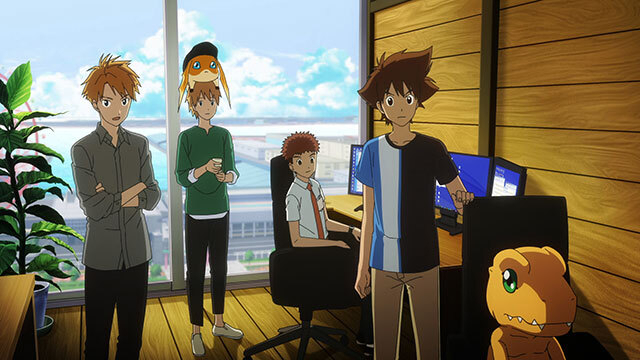

The space itself is depicted with abstract backgrounds and limitless potential, one digital environment appearing as a giant, crystalline floating island, surrounded by other smaller islands. The hallmarks of Mamoru Hosoda (who directed the first Digimon movie along with a number of short films) are still in play, with simple yet creative visual distinctions between the digital world and in the real world, clean red lines used to draw characters while moving about the former, sometimes flattening their coloring as the space around them changes. Despite the franchise’s long history, it’s a film that is more accessible to newcomers than one might expect, thanks to clear narrative stakes, established with impressively little verbal exposition. However, director Tomohisa never gets sidetracked by a desire to deliver bombastic, precisely storyboarded action sequences, balancing them with plenty of quiet moments of introspection and moving companionship between the characters and their Digimon partners. It all kicks off with a thrilling kineticism, showcasing detailed and impactful action that is bound to satisfy even those who have checked out from the franchise since its earlier installments. Despite this, it’s still a joy to see how the older cast has both grown independently and how they coordinate, as even the more contentious relationships (read: Matt and Taichi) have softened in their long time together. It’s surprisingly measured and downbeat, immediately dispelling the idea of nostalgia and affirming how things have moved on since the series’ previous installment. This news all comes at a time where they’re needed to save the world once more, recruited by Digimon researcher Menoa (Mayu Matsuoka of the Palme d’Or winning Shoplifters) and her partner Kyōtarō (JoJo’s Bizarre Adventure’s Daisuke Ono) to help stop a powerful Digimon called Eosmon, robbing other DigiDestined of their consciousness in an adventure billed as Taichi and Agumon’s last.ĭirected by Tomohisa Taguchi (Persona 3 The Movie) and written by Akatsuki Yamatoya, Digimon Adventure: Final Evolution Kizuna’s attitude to such ongoing storytelling is frank and clear from the beginning, as a brief opening title card offers no exposition other than “this is not a story about the past”. Tai and his friends soon discover that when they grow up, their partnership with their Digimon will end and they will be forever separated, the approaching end of this bond indicated by a countdown timer that expires quicker the more they fight together. With these characters now on the cusp of adulthood, the time has come for the most painful part of franchises so squarely focused on friendship like this one: accepting that things can’t always stay the same. The rest of his “DigiDestined” friends are still working together to solve Digimon incidents and help others with their partner Digimon. The more insular, carefree joys of childhood are long behind him, with worries about his future, his career, and his thesis consuming his focus.
#Digimon the movie download series#
Set five years after 2015’s six-part film series Digimon Adventure tri., now taking place in 2010, Digimon Adventure: Final Evolution Kizuna finds the series’ longtime protagonist Taichi (Natsuki Hanae, returning along with the majority of the cast of Digimon Adventure tri.) as a university student, living alone with an undecided future before him. It’s all approached with a refreshing air of finality, too rarely seen in franchises as long-running and as popular as this one.

Characters move on with their lives, relationships change - and end. Digimon, to its benefit, has consistently evolved with each story arc, changing in ways that are permanent and meaningful rather than simply superficial.


The series has come a long way from being (unfairly) branded a Pokémon knock-off, maintaining a distinct visual sensibility and willingness to change that sets it apart from that other franchise, which has contently remained in stasis even this year with the release of the CG remake, Pokemon: Mewtwo Strikes Back - Evolution. Popular animated characters have a tendency to stay ageless, but not in Digimon Adventures, a series that has long been concerned with ongoing maturity, approaching each new step in the lives of its protagonist with thoughtfulness.


 0 kommentar(er)
0 kommentar(er)
